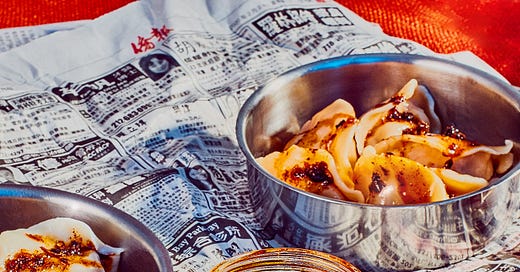When I first moved from China to LA in 2018 to launch Fly By Jing, the genre of spicy, crunchy, savory and oily chili condiment was relatively unknown in the US. One of the only brands available, Laoganma, was mainly found in Asian communities, not having crossed over to mainstream awareness yet. Fast forward to today, and chili sauce is one of the fastest growing condiments driving the industry’s growth and the “international aisle” as a whole is being reinvigorated and expanded by emerging identity-driven brands who are changing how America eats.
It was not long ago that investors told me my product would never find a market big enough, and that no one cared about a mission-driven brand that wanted to change the narrative about Chinese food. We’ve been rejected by PR firms because they already represented one Asian brand client. Just this past year, we were rejected by a major retailer because they “already carried one brand of chili crunch and did not need another.” These are the challenges that brands who exist in a traditionally marginalized space consistently face.
However, the rising tide of emerging brands just like our own cannot be ignored. We have seen and celebrated the growing market of unique and personal flavor expressions, from Homiah’s Malaysian Nonya sauces to Omsom’s Southeast Asian cooking starters, to Fila Manila’s Filipino seasonings. I’ve personally invested in and advise many of them, because the more exciting Asian brands hit the shelves, the more the entire category grows. That market opportunity that investors thought was too small? It only grows and gets validated further.
One of our core values at Fly By Jing is Win/Win. We believe that there always has been and will be enough for everyone, and that we have the power to grow the pie and generate abundance for all. We refuse to play a zero sum game. No one wins, until everyone wins.
This is why it was disheartening when Michelle Tew, the Founder of Homiah, a brand I’m a personal investor and advisor in, texted me a week ago to let me know that she had received a cease and desist letter, demanding she stop using the term “chili crunch” in her product “Sambal Chili Crunch”. It turned out that the same letter was sent to several other brands, many of them emerging small businesses run by founders of color who were making well below $1M in revenue.
I won’t go into detail here but you can read Nina Robert’s excellent article in the Guardian for more details of the case.
Back in 2018, when I first launched our signature “Sichuan Chili Crisp”, I applied for trademark protection for the specific style of sauce I was bringing to market (to this day, there is still no other comparable product on the US market of the same name). It was rejected on the grounds of being ‘descriptive’. Even less specific, the ‘chile crunch’ trademark should also not have been granted. It is a descriptive term for a cultural product, one that has existed in Chinese cuisine for hundreds of years.
I am for the protection of a company’s hard-earned intellectual property through trademark laws, especially against larger players in a market who have an unfair advantage over an emerging startup. But I also reject the oppressive notion that if one holds a trademark, one MUST necessarily use it to go after all companies big and small with abandon. That excuses the actions of the oppressor as if “their hands were tied” and there was nothing they could do but go after small disadvantaged mom-and-pop businesses. This view lacks nuance and is categorically false. Holding a trademark does not necessitate using it to intimidate smaller businesses for the purpose of squashing fair competition.
In marginalized categories like “international food”, the diversity of different options in the market place is beneficial to everyone. I personally invest in and advise numerous emerging Asian food brands including Homiah and Fila Manila because I know first hand how difficult it is for brands like ours to break through. The more examples of success we have in our space, the more support and funding we will receive from investors, retailers and the entire ecosystem. No one wins, until everyone wins.
I hope the silver lining that comes out of this trademark discourse is that the challenges facing emerging brands by founders of color come to light and that we can all operate more from a place of empathy than division. Everyone’s time and effort are better served building their businesses and the broader category, rather than taking action driven by ego-based fear.
Brands like Fly By Jing, Homiah and others exist in a traditionally marginalized space. It was not long ago that we were told our business was too "niche", there was no opportunity or space for brands like ours, selling products like chili sauce. The more entrants and competitors in the space only serves to validate the market opportunity. We refuse to play a zero sum game. The bigger we can grow the pie for all, the better it is for everyone.





Sitting on my bed on this chilly Friday night, dazed from the fatigue of the 36 hours since the news broke. Incredibly moved by this piece that puts into words so much of what we live and experience as emerging minority founders. And most of all deeply grateful for you always leading fearlessly by example Jing — teaching and enlightening and uplifting in the most selfless way.